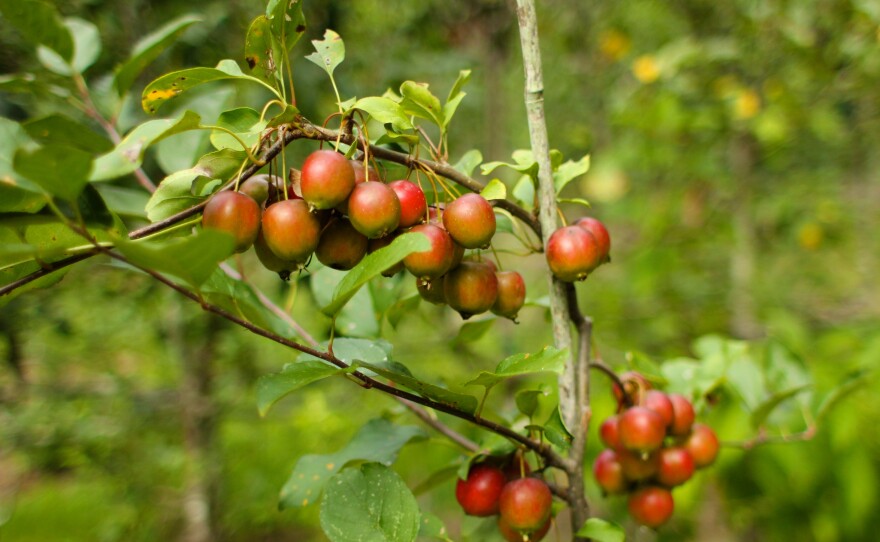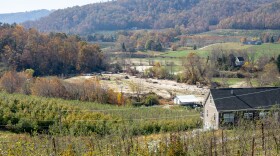In the supermarket today, you can find about a dozen kinds of apples. But years ago, there were hundreds and hundreds of varieties grown all over the South. North Carolina native Lee Calhoun once had 3,000 apple trees growing in his backyard in Pittsboro. I visited him there recently and he showed what was left.
“This is a remnant of an old orchard I used to have,” he said. “Most of them are gone now. This is an Orange Cauley, a little bit different from a regular Cauley, and this is a Green River --that’s a Kentucky apple.”
Calhoun retired from the army in the 70s and built a house in Chatham County with his wife, Edith. They cleared some space in the backyard to plant a garden and fruit trees. And around that time, they ran into an elderly man who started telling them stories about all the different apples that used to grow in the county.
“He mentioned Red June and a Transparent apple and a Magna Bonna. Being a history buff, it sort of interested me that people had grown apples that I’d never heard of before in this area,” Calhoun said. “So I thought, if I’m gonna have a few apple trees in the yard, why don’t I grow some of the old timey apples.”
The only problem was, nobody sold those old apples anymore. So Lee got in his car and started driving around the county, looking for apple trees. When he spotted one in a field or in somebody’s yard, he’d knock on their door and ask what kind it was.
“Often they would say ‘well, that was here when we bought the place,’ or they’d say ‘well, granny knew but she died 5 years ago, and nobody paid attention,’” Calhoun recalled. “But sometimes, they would say, ‘well, that’s a Blacktwig apple my dad planted in 1905,’ and it’s this big old half rotten tree out there.”
Calhoun would get a cutting from the tree and plant it in his backyard. After he scoured all the roads in Chatham County, he went to neighboring counties, and after that, to neighboring states. He went to Virginia, Georgia, South Carolina, Arkansas, Tennessee and Alabama. He started writing letters to rural newspapers, asking readers if they had old apple trees, and people responded. The Calhouns would often drive hundreds of miles just to get a cutting from a single tree. They did this for years.
“I started out looking for 2 or 3 and I’d found 400!” Calhoun says. The Calhouns researched every single apple. They found detailed descriptions in old seed catalogs. They actually found records of about 2,000 southern apple trees. But nearly 1,600 of those had gone extinct. In 1995, the Calhouns wrote a book about their findings called Old Southern Apples.
One thing that makes apple trees hard to preserve is that each seed produces a different variety of apple. So if you want to grow, a Gala apple tree, for example, you can’t plant a seed from a Gala apple. You have to take a cutting from a living Gala tree and graft it onto another apple tree.
Mike Parker is the tree fruit extension specialist at NC State. I asked him about the importance of saving heirloom varieties. If each seed produces a new kind of apple tree, wouldn’t it be easy to just keep coming up with new apple varieties? He says it’s not that simple.
“The chance of those being of equal or superior quality to their parents, the fruit that is, is somewhere around 50,000 to 1,” Parker says. “I mean, it’s a very, very long shot.”
"Once we lose an apple variety, we just can't get that back. We can't rebuild a variety." - Mike Parker
So to get 450 varieties of apples -- apples that are edible, and resistant to diseases and grow well in the southern climate, it would have taken over 22,000,000 seeds. Parker says keeping these varieties around is important from a purely historical perspective.
“People spend a lot of time and money, they restore cars and they restore buildings,” Parker says. “I mean for goodness sakes, we’ll restore buildings from a foundation and we’ll build this structure and say, ‘this is what it was’ And we can do that from plants. However, once we lose an apple variety, we just can’t get that back. We can’t rebuild a variety, if you will.”
But more than just history, the trees might also be useful. Those 450 varieties were kept alive by families because they were good for something. Some made good pies, others made great applesauce. And some, made really good cider. According to the US Beverage Marketing Corporation, cider is one of the fastest-growing segments of the beverage market.
Foggy Ridge is a large cider company in southwest Virginia, and they’re using some of the apples that Lee Calhoun found in people’s back yards.
“We’ve had incredible growth, and it’s really on the backs of these old fashioned apples,” says Diane Flynt, who runs Foggy Ridge. “If I didn’t have these apples, my cider wouldn’t taste very good.”
Lee Calhoun is 79 years old now. His yard still has a few apples trees, even though he doesn’t tend to them like used to. In 1997, he gave his whole collection to a couple other orchards in the state.
“The best we can do now is to try to save some of these old apples make them available if anyone who wants to grow them,” Calhoun says. “We have places that are preserving them. And that’s where we are. And that’s probably where we’ll stay for a long time.”
Calhoun doesn’t think everyone should grow their own apples. But he think it’s important to keep the old trees around, just in case.













